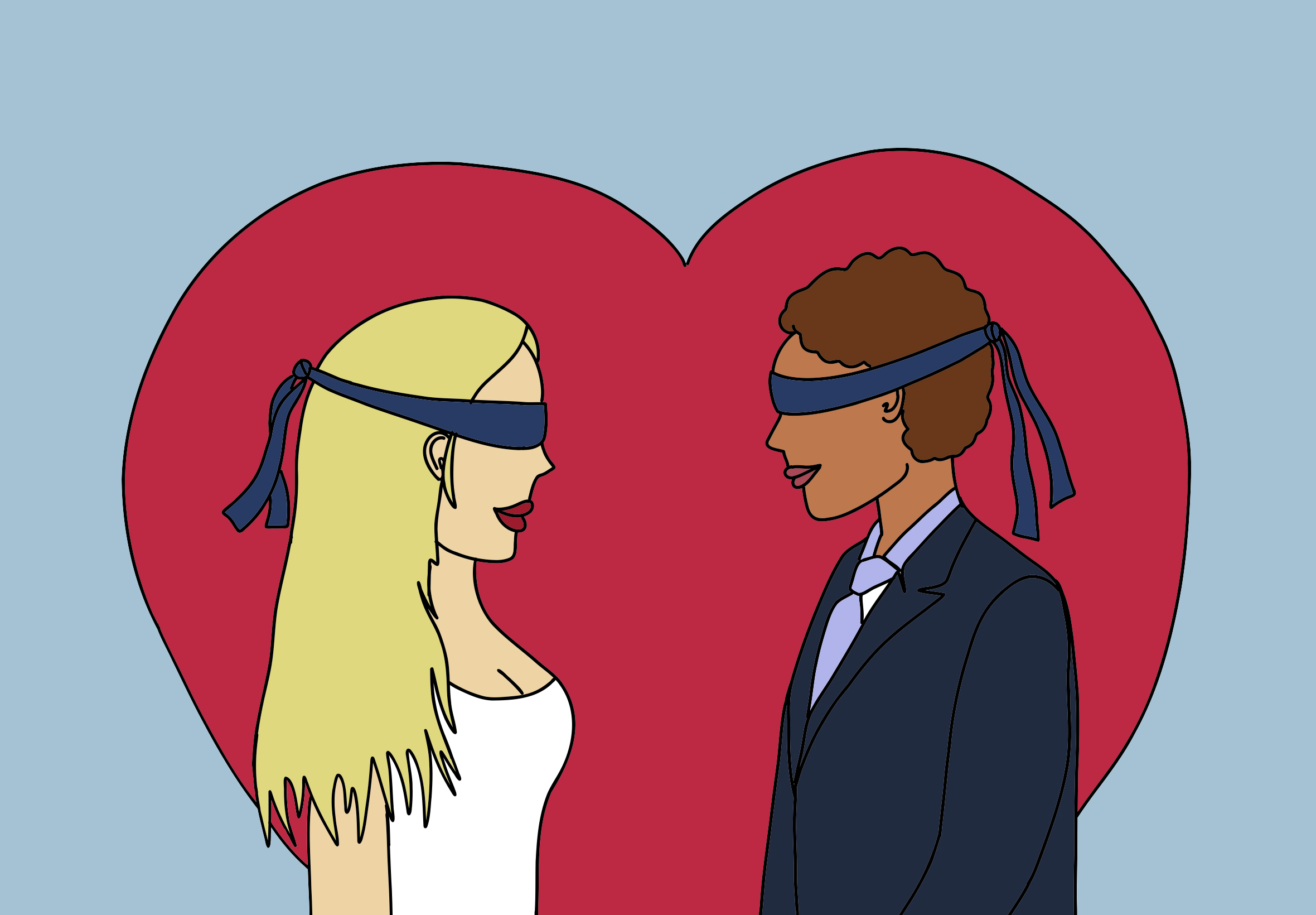How the hit Netflix show allows for meaningful conversations about life and love

Illustration by Sona Eidnani.
One of my favourite roommate bonding activities is watching Love is Blind. This latest season contains themes that I think are especially relatable for Gen Z daters, like value alignment — offering a unique chance to consider our own lives while watching juicy reality TV.
I watched Season 2 in my dorm room in my first year with my new friends, and we just finished watching Season 8, now in my small house’s living room, a few months before we graduate.
If you’re unfamiliar, the Netflix show centres around the idea of having couples talk and fall in love without ever seeing each other, only to meet for the first time in dramatic “reveal” once they have agreed to get married.
The show follows them through the journey of their relationships, starting in the dating “pods,” then on a retreat vacation, and then in their everyday lives. Each season ends with the weddings, where couples either say “I do” or “I don’t” in front of their loved ones. It makes for great television.
I feel that this show offers a unique venue to discuss the woes of dating, opening us up for important conversations. Its outlandishness paired with its “real-world” situations lend for the right environment to consider our own experiences of dating in university. And it’s not all positive.
One theme that was prevalent this season was the idea of value alignment in a relationship. A woman struggled with the fact that her fiancé did not support the same social movements as her, after he didn’t feel comfortable saying that Black Lives Matter.
This got us thinking about the idea of value alignment — the concept that most people like to date those who agree with their morals and ethics. This might be becoming increasingly difficult for Gen Z daters, since data indicates that the men of our generation are becoming more and more conservative, while women are the opposite.
Dating apps like Hinge allow its users to identify their political views, and my single friends report that men will often set theirs as “conservative,” “moderate,” or “not political.” For many of them, that means an immediate “No” to their profile.
Are people enjoying this show because they see dynamics from their lives playing out on the screen? I argue that we are. And it’s not only when politics come into play.
Another aspect of Love is Blind is the core concept of the show — that looks don’t matter in a true loving relationship. It’s been said that the only genuine season of Love is Blind is the first one, when participants had no idea what type of people might be chosen as their suitors.
Since then, it seems more and more likely that people might enter the show with the understanding that only attractive singles are selected. This feels plausible to me, and negates the entire premise of the show.
Yes, love may be blind in the sense that they aren’t sure if their partner will have a beard or not, but it’s clear that the casting directors are looking for a certain type of look when choosing participants.
In omitting people of diverse weights, people with visible disabilities, and anyone who falls short of North American beauty standards, it feels to me that the creators of Love is Blind are admitting the opposite of the title of their show.
Are they fearful of how a reveal might go if one person is not “conventionally” attractive? If so, they are succumbing to the very standards that the show perpetuates.
It causes us viewers to think about our own experiences with dating apps and real life encounters, where beauty reigns supreme and prospective partners’ profiles can be scrutinized mercilessly.
In this sense, the show is a mere byproduct of toxic beauty culture and a perpetuator of all things superficial. By addressing some of these themes once reveals happen and partners react to the looks of their soon-to-be spouse, we get to live out these experiences in real time.
Another conversation brought on through Love is Blind is its heteronormative gender roles. It’s always the man’s job to propose, and it looks the same every single time. These proposals, where the women are never allowed to initiate or plan, have spurred discussions between my friends and I about how or when or if we would like to become engaged.
Between dates, in their respective living quarters, the men sit in their grey-green-blue living area, sipping whiskey, and the women debrief their dates in their perfectly pink kitchen. It feels like a slap in the face to any progress we might think we are making in a world where everything is gendered.
Whether purposeful or not, I suspect that these themes drive viewership, as we watch intently as constrictive gender rules play out in other people’s lives as they do our own.
And so, here I am, watching every season of this show. Part of it is fascination, and part of it is the hope that perhaps one day we will get a Love is Blind: Queer Love (like the Queer version of Netflix’s Ultimatum that had everyone at the edge of their seats).
But mostly, I love watching this show for the same reason I think we all do: to watch others grapple with the realities of modern dating, while laughing and gasping with our friends.







